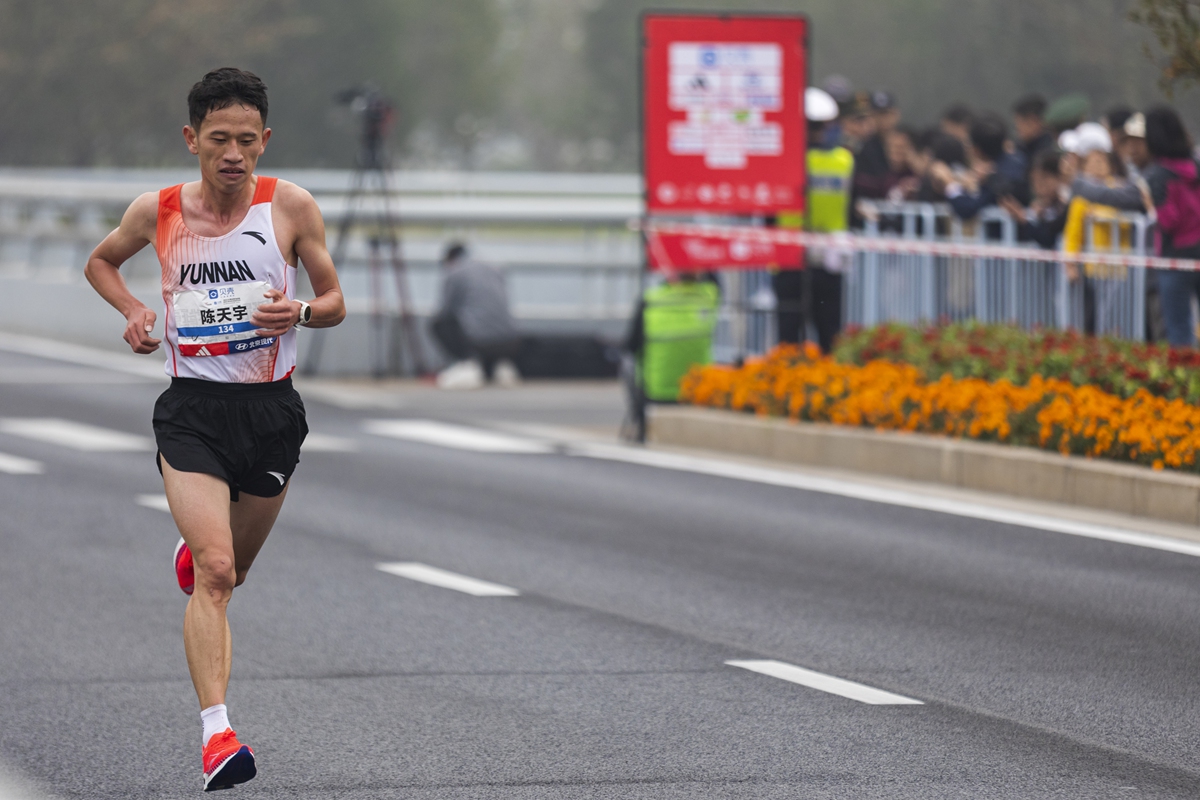
Runners compete in the Beijing Marathon on Sunday. Photo: VCG
Some 30,000 runners competed in the Beijing Marathon in the early morning of Sunday, starting at the Tian'anmen Square in downtown Beijing.
The race in the Chinese capital, dubbed the country's flagship marathon, attracted over 130,000 runners to register for the 30,000-slot lucky draw, as all participants, regardless of athletic skill level, are required to take on the full distance of 42.195 kilometers.
Chinese runner Chen Tianyu brought fresh competition to the race traditionally dominated by elite African runners, as he finished in the overall seventh place with a time of 2:08:11. Geleta Ulfata of Ethiopia won the championship in 2:07:41.
Though the result, surpassing the previous best domestic time set by Ren Longyun of 2:08:15 in 2007, Chen's time was just one second short of seeing him qualify for the Paris Olympics. But it makes him the third-fastest Chinese runner of all time, following compatriots He Jie and Yang Shaohui who clocked in 2:07:30 and 2:07:49 respectively at the Wuxi Marathon in March 2023.
"My original goal was to finish in under 2 hours and 10 minutes, but I felt great when competing with the elite runners," Chen, who is no stranger to endurance races, told reporters after the race, before crediting the optimization of the racecourse that reduced turns and slopes that contributed to his achievement.
The racecourse for the Beijing Marathon, the oldest marathon in China as it inaugurated in 1981, is considered picturesque, as it features several iconic landmarks in the ancient and modern metropolis including the Military Museum of the Chinese People's Revolution and the CCTV Tower, before concluding at the Olympic Park near the Bird's Nest or the National Stadium where the opening ceremonies of the 2008 Olympic Games and 2022 Winter Olympic Games were held.
Tandem marathon races were also held on Sunday in a number of provincial capitals across China, including Xi'an, Northwest China's Shaanxi Province; Ji'nan, East China's Shandong Province; Zhengzhou, Central China's Henan Province; Changsha, Central China's Hunan Province as well as Chengdu, Southwest China's Sichuan Province.

Chinese runner Chen Tianyu runs in the Beijing Marathon on Sunday. Photo: VCG
Running feverBefore the COVID-19 pandemic, marathons had grown in popularity in China.
In 2018, China witnessed a marathon boom with 278 certified events held in the Chinese mainland, followed by a total of 330 races in 2019, before a 2020 dip to just 51 races, according to the Chinese Athletics Association (CAA).
World Athletics road running manager Alessio Punzi said earlier in October that 68 Chinese running events filed their applications to World Athletics in 2023, while a total of 133 road races across China were registered between January and June, according to the CAA.
For those unable to make it to the Beijing event, an online race was also held on the popular fitness tracking site Keep, where participants who finished a recorded marathon race elsewhere stood to win a commemorative medal. As of press time, nearly 30,000 people had registered in the online race.
Alongside an increase in the popularity of marathons in China is an increasingly health-conscious population in the country.
A 2020 National Fitness Activities Report released by the Beijing-based National Fitness Monitoring Center revealed that among adults, walking and running were the two most popular physical activities, accounting for 22.7 percent and 19.8 percent, respectively.
"Hosting marathon races could immediately boost local tourism and further stimulate local economic growth, as it is a good marketing tool which utilizes good word of mouth if the events are well organized," Mao Jiale, a Chengdu-based sports commentator, told the Global Times on Sunday.
"Nowadays fitness and health have taken root in people's hearts, as we see the number of people taking exercise growing, especially after the national policy on fitness was introduced."
Recent statistics show that the number of people who regularly participate in outdoor exercise in China currently exceeds 400 million.
Health concernsSome fans raised concerns over the air quality in the Chinese capital on Sunday when the Beijing Marathon was held, as data from the China National Environmental Monitoring Centre designated it as "mild to middle pollution."
This is not the first time that organizers have had to contend with air quality issues.
It is, however, "extremely difficult" to reschedule the event as nearly half of the participants had made their way to Beijing from other cities across the country, an official with the organizing committee told the Global Times.
Jiang Chong, a physiotherapist who is also an occasional distance runner, warned that amateur distance runners should be aware of the consequences if they decide to participate in an ultramarathon.
"The path to marathon success is no walk in the park. Injuries to the hip, knee, and ankle joints are regularly suffered by marathon runners, as it is in fact a challenging endeavor to finish a marathon," Jiang told the Global Times.
"Targeted training in strength, speed, and endurance is paramount. Simply lacing up your running shoes without adequate preparation can lead to injuries that may prematurely end one's love affair with the sport."
She underlined that it takes scientific training, gradual progress, and setting achievable goals to successfully tackle the full 42.195-kilometer race.
"Warming up adequately before running, stretching after running, and training progressively are the foundations of consistent long-distance running," Jiang said.
"It is not only a matter of joints, but it also tests the effectiveness of the cardiovascular system. Regular medical checkups will also help to detect problems in time before worse problems occur."





